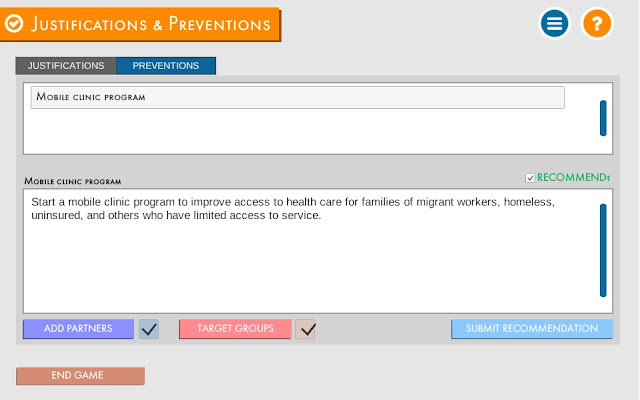Image
credit: Community Health Nursing by BreakAway Games
One of the areas of interest on which BreakAway
Games are focusing and for which they are currently developing apps is
Community Health Assessment.
Community Health is a field where simulating an
environment for learners to assess and practice their processes makes great
sense:
Aimed at university and post-graduate level community health nursing
students, the game challenge is analogous to the real world tasks a Public
health nurse performs - observing a community, talking with its members and
isolating and addressing public health concerns.
"The recent shift in healthcare delivery from that of the hospital to the community calls for skilled community health nurses. The role and practice of community health nurses differs from that of a nurse clinician. Unlike the skills required for that of a nurse clinician, much of the skills required for community health nursing and their application cannot be developed and practiced within newly developed and highly innovative practice laboratory facilities where the focus of patient care is the individual. Virtual simulation and serious gaming present a viable, cost-effective training option for community health nursing trainees, providing the opportunity to practice within an interactive, engaging, and safe environment. (Stuckless P., Hogan M., Kapralos B., 2014, Virtual Simulations and Serious Games in Community Health Nursing Education: A Review of the Literature. In: Ma M., Jain L., Anderson P. (eds) Virtual, Augmented Reality and Serious Games for Healthcare 1. Intelligent Systems Reference Library, vol 68. Springer, Berlin, Heidelberg)."
To that end, BreakAway Games have a few
applications currently under development where a learner investigates a
community, observes different neighborhoods, communicates with community
stakeholders, researches news and reports and more. Once the investigation
steps have been completed, the learner selects topics of concern and executes
prevention plans to address a set of issues present in the community.
Community Health Nursing tests knowledge and fortifies practices for learners in a
public health nursing program. The player-student is responsible for
investigating the situation and making decisions as a Public Health Nurse in a
small, hypothetical U.S. community.
Gameplay
The initial phase of gameplay involves
investigating the neighborhoods of the community to determine what possible
issues might be presented. The following phase involves communicating with
discovered community members and researching news and reports to determine
possible stakeholders and affected demographics within the community.
A
successful player will perform windshield surveys to gain firsthand information
about the community; interview community members for awareness of the
individual’s understanding or commitment to community conditions, health topics
and prevention; research information in news and reports related to various
topics and prevention; select a feasible topic to address and select related
prevention plans to enact.
The
player must follow the guidance from the Community Health Coordinator to
successfully analyze the community.
The final phase permits the player to select a
topic upon which they feel has enough warrant to focus their attention.
Thereafter they will apply one or more related prevention strategies, each
involving targeted community stakeholders and specific demographic groups.
Completing these activities prepares the learner to perform their real-world
analog activities when they begin their fieldwork.
Image
credit: Community Health by BreakAway Games
Each scenario is unique in its community composition, but
even within a scenario, a learner has the ability to choose different topics
and prevention plans each time, dependent on what they have observed or desired
to pursue, with assessment and instrumented metrics pertinent to their
performance for each topic and prevention chosen.
The player is assessed on how well they perform
the processes involved in executing a prevention plan. The instrumented metrics
focus on the relationship between player-marked important observations,
interviews and news and the player-selected topics and prevention. Additional
assessment is directly related to which stakeholders and demographic groups
have been selected for a given prevention plan, and how pertinent those
stakeholders and groups are to a specific topic or given prevention plan. As
another part of the resource management aspect of the game, after a learner
commits to a prevention plan, they are permitted to end the scenario if they
wish or continue and observe or build enough community resources to enact
additional prevention plans.
There is an assessment report upon completion
of the game. This report will enumerate the player’s pertinent actions as well
as indicate the actions’ pertinence to the prevention and topics selected.




